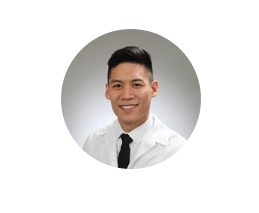The Past, Present, and Future of My Path to Endodontics
 By Kevin W. Yu, DMD
By Kevin W. Yu, DMD
In the spring of 2020, the landscape of dentistry suddenly changed. I found myself as the sole dentist in an urgent care clinic environment, treating individuals experiencing severe dental pain. At the time, I faced a complex reality: widespread fear surrounding the pandemic, significant supply shortages, and constantly changing directives at the local, state, and federal levels. However, as a newer member of the Berkeley Dental Society Board of Directors, I also witnessed dentists in my community step up and adapt to the new reality by reaching out to secure and share personal protective equipment, volunteering to treat emergent dental needs, and recognizing the influence the tripartite had in ensuring dentistry was considered an essential service.
Yet, while I could provide a range of emergency care as a general dentist, including extractions and root canal treatments, there were cases of greater complexity that were beyond my scope of practice and required referral to a specialist. This experience was one of many that inspired my decision to pursue a specialization in endodontics.
With over five years in general practice, I was drawn to endodontics diagnostic challenges and precision to save teeth whenever possible. When the opportunity arose, I stayed late to shadow the traveling endodontist at my office and took time off to observe endodontists in the community. I saw firsthand how clinical expertise and specialized technology could lead to predictable outcomes in complex cases, including cone-beam computed tomography and the operating microscope.
Now, as a resident of the Graduate Endodontics Program at Marquette University School of Dentistry, I have grown as a clinician, taking on the complex cases that I once avoided. The residency has also allowed me to practice evidence-based endodontics, providing a greater understanding of why we treat a particular tooth in a specific way. Beyond improving clinically, residency has allowed me to participate in organized dentistry. As a former resident member of the American Association of Endodontics Practice Affairs Committee, I witnessed and participated in the behind-the-scenes discussions that influenced decisions to advance our specialty.
Reflecting on how we shape the future of our field, whether through involvement in local dental societies or national organizations, I have learned that leadership in dentistry extends beyond the operatory. Engaging with peers, contributing to collective goals, and advocating for policies that impact our profession is as critical as achieving the desired result on a postoperative radiograph.
As residents, we are deeply investing in the future of our profession. Yet, we train under financial pressures that can influence and sometimes limit our career paths. The Resident Education Deferred Interest (REDI) Act is bipartisan legislation allowing dental and medical residents to defer federal student loan interest accrual while in training when repayment is not feasible. By supporting the REDI Act, we enable more residents to pursue paths based on clinical passion rather than financial constraints. Supporting legislation like the REDI Act ensures the future of our profession remains inclusive and service-oriented.
Specializing in endodontics has given me a deeper appreciation for the art and science of preserving teeth, and it has shown me the critical role of advocacy in shaping policy. As I complete my residency, I remain committed to growing as a clinician and an active member of the endodontic community.
Disclaimer
The views and opinions expressed by authors are solely those of the authors and do not necessarily reflect the official policy or position of the American Association of Endodontists (AAE). Publication of these views does not imply endorsement by the AAE.
